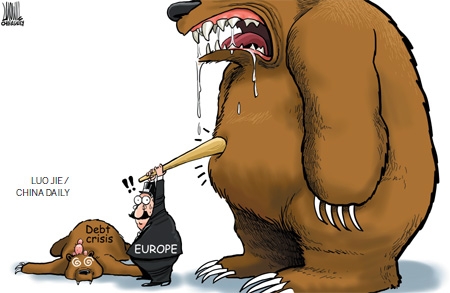 |
One year after the outbreak of Europe's sovereign debt crisis, negative news came one after another.
On May 9, Standard & Poor's downgraded Greece's credit rating to "B". On May 16, the European Union (EU) and the International Monetary Fund (IMF) announced 78 billion euros to Portugal as emergency assistance. On June 13, Standard & Poor's further downgraded Greece's credit rating to "CCC", and would continue to maintain a negative outlook. This is the lowest sovereign credit rating Standard & Poor's gives.
The reappearance of the European sovereign debt crisis has shocked vulnerable financial markets worldwide, and oil prices and commodity prices fell accordingly.
The European debt crisis continues to escalate even after the introduction of the largest rescue package in history, worth 750 billion euros. This amount of money is enough to cover all the matured debt in 2010 and 2011 of the five countries with low credit ratings in Europe: Portugal, Italy, Ireland, Greece and Spain.
The most important reason for the financial crisis is probably because the market believes the emergency loans the EU and IMF provided is not a good way to help those countries to move forward. Loans may only postpone the crisis.
The biggest problem for the five countries is they have borrowed a lot from the financial market when their national competitiveness is declining. These countries were not able to repay their sovereign debt themselves, which resulted in the crisis.
With the emergency loans, the crisis-laden countries can only repay old debts with new debts. The loans do not bring down the scale of the total debts, but simply extend the repayment date. If the five countries do not increase their solvency, then as the new debt matures, the crisis will be revived.
For example, a dynamic condition of sustainability of government debt is that the country's future economic growth should not be lower than the government debt's interest rate. The interest rate of the 110 billion euro loan that Greece received from the EU and IMF starts at 5 percent and then is reduced to 4 percent.
But in the next few years, it might be difficult for Greece to have an economic growth rate higher than 4 percent. This means that it is extremely difficult for Greece to repay the emergency funds, not to mention the repayment of those debts borrowed at market interest rates.
To get out of the sovereign debt crisis, Greece is facing two choices. It could adopt structural adjustments to improve national economic competitiveness and make its economic growth rate higher than interest on debt to repay existing debts. Or, it could improve the reimbursable condition of current debts by lowering interest rates or by reducing the scale of debts based on restructuring.